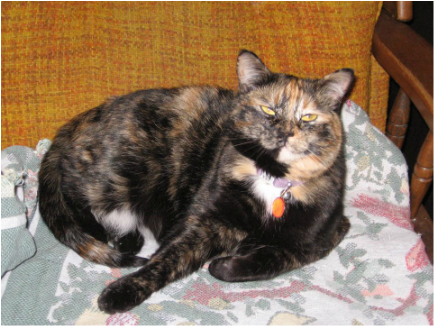Caring for Aging Pets
 It's a new year, and with that fact comes another: we'll all turn another year older; so will our pets. Like humans, animals age. Whereas people can live to be 90 or older, sadly, our pets aren't with us that long – at least, not in years as we humans know them. According to the American Veterinary Medical Association (AVMA), cats and small dogs are considered “geriatric” at age seven, larger dog breeds even sooner. Generally, pets are considered in their “senior years” around age 10 (younger for large dog breeds).
It's a new year, and with that fact comes another: we'll all turn another year older; so will our pets. Like humans, animals age. Whereas people can live to be 90 or older, sadly, our pets aren't with us that long – at least, not in years as we humans know them. According to the American Veterinary Medical Association (AVMA), cats and small dogs are considered “geriatric” at age seven, larger dog breeds even sooner. Generally, pets are considered in their “senior years” around age 10 (younger for large dog breeds).The adage “one dog year is equivalent to seven in human years” may make things simple for people in terms of age calculation; however, according to the AVMA, it's not as easy as that. Although a small seven-year-old dog or a cat may be about 45 years old in human years, a seven-year-old large dog is closer to a 50 to 55-year-old person. A 15-year-old cat or small dog is considered about 75 years of age in human years and a large 10-year-old dog is about that same age in human terms. Learn more about animal age at https://www.avma.org/public/PetCare/Pages/Caring-for-an-Older-Pet-FAQs.aspx .
With increased years comes increased, and differing, health issues, from mobility concerns to cancer. How do we care for our aging pets? Here are a few tips:Feed your furry friend nutritious food. Aging brings health concerns, such as diabetes, weight, and kidney/urinary tract disease. A more nutritious food can help senior pets, and some many need specialty food. Talk with your veterinarian about the type of diet your older pet may need. S/he can make recommendations about quality pet food brands or special formulas your senior friend needs to thrive in its older age. Keep your pet at a healthy weight. Again, quality food will help as will continued regular exercise, although the type of exercise your pet engages in might need to be changed (instead of running and hiking, your older dog may need to scale back to walking short distances).Schedule regular check-ups with your veterinarian. You may need to increase your visits from once a year to twice a year – a lot can change in a senior pet's life between veterinary visits, and keeping tabs on your pet's health, including any changes, is the key to maintaining good health or changing diet/medications/etc.Ensure good teeth in your pet. Dental care is critical to your four-footed companion's health. Brush your pet's teeth and consult with your vet about regular cleanings. Tartar build-up can cause gingivitis, which can cause bacteria to get into your dog or cat's bloodstream, causing major problems to its vital organs. Is your pet incontinent? This can be a sign of simple aging or of a more complex medical issue. Consult your veterinarian if this situation arises. Using pee pads and doggie diapers may be two ways to deal with incontinence. Limiting your pet's water intake, especially at night, may also help.
For more information on senior pet care, visit these websites:
http://www.petmd.com/dog/care/evr_dg_caring_for_older_dogs_with_health_problems
https://www.petfinder.com/dogs/dog-care/senior-dog-care/
and
http://www.vetstreet.com/dogs/caring-for-senior-dogs-what-you-need-to-know
My pets are nine and older. One is experiencing major health issues, our cocker spaniel Cody, who is nearly 18. Arthritis, incontinence, deafness, and cataracts are among his health problems. I've had only one pet live to this age – she didn't have the number of medical conditions that Cody has, so this is a new journey for me. However, I'm thankful for each day I share with Cody, snuggling on the couch or taking (very) short walks in the yard or at our mountain property. Sometimes it's a struggle to deal with my elderly guy's medical problems (from “doggie dementia” and bad teeth to loss of senses and bladder control). But, dealing with kids and aging parents is also challenging, therefore, the understanding and patience required are all the more sweet and necessary for this journey … and for life's journey.
Our time with our elderly furry family members, as well with as our human family members, is precious. Take the best care possible with your pet and enjoy the journey for as long it lasts. Our animals' loyalty and affection deserve returning.

Published on January 09, 2016 08:42
No comments have been added yet.



